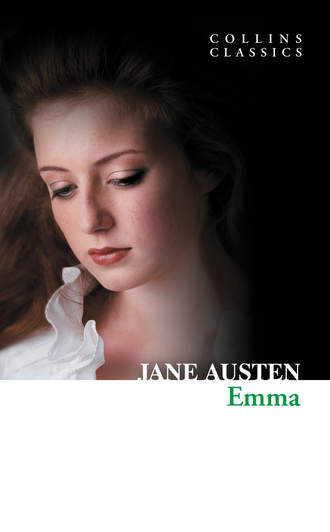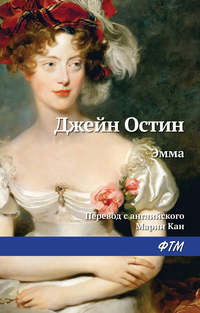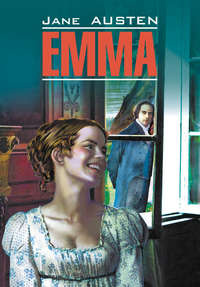
Полная версия
Emma

Emma
Jane Austen

To His Royal Highness The Prince Regent, this work is, by His Royal Highness’s permission, most respectfully dedicated, by His Royal Highness’s dutiful and obedient humble servant, The Author
Table of Contents
Cover Page
Title Page
Dedication
History of Collins
Life & Times
VOLUME ONE
CHAPTER 1
CHAPTER 2
CHAPTER 3
CHAPTER 4
CHAPTER 5
CHAPTER 6
CHAPTER 7
CHAPTER 8
CHAPTER 9
CHAPTER 10
CHAPTER 11
CHAPTER 12
CHAPTER 13
CHAPTER 14
CHAPTER 15
CHAPTER 16
CHAPTER 17
CHAPTER 18
VOLUME TWO
CHAPTER 19
CHAPTER 20
CHAPTER 21
CHAPTER 22
CHAPTER 23
CHAPTER 24
CHAPTER 25
CHAPTER 26
CHAPTER 27
CHAPTER 28
CHAPTER 29
CHAPTER 30
CHAPTER 31
CHAPTER 32
CHAPTER 33
CHAPTER 34
CHAPTER 35
CHAPTER 36
VOLUME THREE
CHAPTER 37
CHAPTER 38
CHAPTER 39
CHAPTER 40
CHAPTER 41
CHAPTER 42
CHAPTER 43
CHAPTER 44
CHAPTER 45
CHAPTER 46
CHAPTER 47
CHAPTER 48
CHAPTER 49
CHAPTER 50
CHAPTER 51
CHAPTER 52
CHAPTER 53
CHAPTER 54
CHAPTER 55
CLASSIC LITERATURE: WORDS AND PHRASES
Copyright
About the Publisher
History of Collins
In 1819, Millworker William Collins from Glasgow, Scotland, set up a company for printing and publishing pamphlets, sermons, hymn books and prayer books. That company was Collins and was to mark the birth of HarperCollins Publishers as we know it today. The long tradition of Collins dictionary publishing can be traced back to the first dictionary William published in 1824, Greek and English Lexicon. Indeed, from 1840 onwards, he began to produce illustrated dictionaries and even obtained a licence to print and publish the Bible.
Soon after, William published the first Collins novel, Ready Reckoner, however it was the time of the Long Depression, where harvests were poor, prices were high, potato crops had failed and violence was erupting in Europe. As a result, many factories across the country were forced to close down and William chose to retire in 1846, partly due to the hardships he was facing.
Aged 30, William’s son, William II took over the business. A keen humanitarian with a warm heart and a generous spirit, William II was truly ‘Victorian’ in his outlook. He introduced new, up-to-date steam presses and published affordable editions of Shakespeare’s works and Pilgrim’s Progress, making them available to the masses for the first time. A new demand for educational books meant that success came with the publication of travel books, scientific books, encyclopaedias and dictionaries. This demand to be educated led to the later publication of atlases and Collins also held the monopoly on scripture writing at the time.
In the 1860s Collins began to expand and diversify and the idea of ‘books for the millions’ was developed. Affordable editions of classical literature were published and in 1903 Collins introduced 10 titles in their Collins Handy Illustrated Pocket Novels. These proved so popular that a few years later this had increased to an output of 50 volumes, selling nearly half a million in their year of publication. In the same year, The Everyman’s Library was also instituted, with the idea of publishing an affordable library of the most important classical works, biographies, religious and philosophical treatments, plays, poems, travel and adventure. This series eclipsed all competition at the time and the introduction of paperback books in the 1950s helped to open that market and marked a high point in the industry.
HarperCollins is and has always been a champion of the classics and the current Collins Classics series follows in this tradition – publishing classical literature that is affordable and available to all. Beautifully packaged, highly collectible and intended to be reread and enjoyed at every opportunity.
Life & Times
About the Author
Jane Austen was born into a moderately wealthy family in 1775, during the reign of King George III. Her family was typically large as was customary at the time in order to counter the possibility of early death by producing many offspring. She had five older brothers, one older sister and a younger brother.
Austen was born in a small village in Hampshire, England, named Steventon, where she lived until 1800. She would read out her early attempts at novels to her family and refine and hone the words based on their response. In this way she completed first draft manuscripts of Sense and Sensibility and Pride and Prejudice, although they were originally titled Elinor and Marriane and First Impressions respectively. She also wrote the manuscript for Northanger Abbey in this way, which was initially given the name Susan.
In 1800 Austen’s father, William George Austen, decided to move to the City of Bath. At that time, it was normal for unmarried daughters to live with their parents, so Austen found herself moving to a Georgian city, having previously known only a rural life. Despite her association with Bath, it seems that urban society did not really suit Austen, and her output as a writer fell away for the next few years, until she returned to the countryside. Austen’s father died in 1805, leaving the family financially insecure. Austen’s mother, Cassandra, took Jane and her sister, Elizabeth Cassandra, to Southampton in 1806, where they were based with her brother Frank and his wife. Finally, in 1809, Austen’s brother Edward offered the three of them a cottage in his grounds at Chawton, another village in Hampshire.
With new found security and a more settled lifestyle, Austen found herself able to write once more. By 1811 she had become a published novelist with Sense and Sensibility. There followed, Pride and Prejudice in 1813, Mansfield Park in 1814 and Emma in 1815. At about this time Austen began to feel unwell and suffered from a progressive disease, which saw her health decline. She continued to write but became increasingly infirm until she succumbed in December 1817 at the age of 41. Her final novel, Persuasion, was published posthumously along with Northanger Abbey shortly after her death. There is also a seventh, incomplete, manuscript named The Brothers or Sanditon, which she started to write in 1817, even though her health was deteriorating
There has been considerable speculation about the nature of Austen’s illness. The two most likely culprits are Addison’s disease and Hodgkin’s lymphoma, both of which were described and named later in the 19th century. It is known that she suffered bouts of fatigue and difficulty in walking. She eventually died in the City of Winchester and was laid to rest in Winchester Cathedral.
The wind of change was so strong following Austen’s short life that her novels fell out of favour quickly with the onset of the Victorian era. Her books continued to sell, but they were not considered fashionable, as people gravitated towards the gritty realism portrayed by Dickens, Hardy and their contemporaries. The public wanted to read about characters exposed to the harshness of life without privilege, as opposed to Austen’s characters whom were generally rather comfortable and concerned themselves with matters of little real consequence.
Austen was actually using elements of her own, relatively comfortable life to weave her tales of fiction, so to her they were genuine situations and circumstances worthy of analysis. She also never married, so her angst was focussed on pondering matters of the heart. In many ways she lived vicariously through her characters, allowing them to experience the intimacies that she craved, but that eluded her all of her life.
Visit www.AuthorTracker.com for exclusive information on your favorite HarperCollins author.
Austen’s Literary Genre
It is interesting to note that many contemporary authors choose to give their novels period settings as their plots often rely on rules of formality and etiquette and characters must behave in a certain way to ensure that a narrative will work. Jane Austen was living and writing in a time when such rules were part of polite society and can be seen as the originator of this plot devise. It is fair to say that societal rules reached their zenith of priggishness during Austen’s lifetime. It was all about defining oneself in terms of class and wealth, so that there were very clear guidelines about what one should and should not do and how one should behave.
Austen was herself born into a family at the lower end of the English hierarchical stratum known as the gentry, which was situated beneath the nobility. In modern terms she would have been considered well educated and privileged. This gave Austen a certain vantage point as a writer, for she rubbed shoulders with people both above and below her on the social scale.
Austen was a humanist and made it abundantly clear that she thought little of the notion that some people were better or worse than others simply through accident of birth. In essence, her literature is defined by her desire to express that it is what goes on inside a person that matters above and beyond other concerns. Austen makes theatre of the absurdities that she observes in polite society because she has an innate cynicism, but she always avoids being vitriolic in her prose.
It is this delicate balancing act between crafting an engaging narrative and passing comment with subtle allegory that made her novels a success then and now. Austen expertly translates her criticism of the human condition into witty and insightful prose. Through her satirical eye, the characters become relevant to the reader as they recognise elements or traits of themselves or others in the disparate personalities. Although such psychological connectives were more pertinent in society at the time that Austen was writing, they still resonate today because people frequently gravitate towards societal rules, albeit in a less formalized way. Therefore, it is still easy to relate to Austen’s stories through the experiences of her characters and the situations and events that arise in her novels are timeless and emotive.
Austen was not, however a romanticist. She was at the cutting edge of English literary fiction, just as the artist Joseph Turner was at the cutting edge of English painting. Both were born in the same year, 1775, and both used their creativity to document the modern world they knew. Austen is often described as a sentimental novelist, because her themes are primarily about the exploration of human feeling and emotion. This was a concept relatively new to society at the time, not least because everyday life hadn’t yet afforded people the luxury of the leisure time necessary for such self-indulgences. Indeed, during Austen’s lifetime it was still only the wealthy with time on their hands. Most were far more concerned with the hardships and realities of making a living and raising a family. That is largely why Austen’s novels focus so much on the upper echelons of society, as only the idle rich were not preoccupied by such matters of survival.
Austen’s life was short, but it spanned the turn of the 19th century, when the Industrial Revolution was in full spate. After her death, English literature made way for a new genre, realism, which saw novelists using their prose to illustrate the lives of the common man, woman and child who struggled to adapt to a rapidly changing environment, rife with disease, poverty, injustice, criminality and urbanization. Had Austen lived longer perhaps she would have responded and adapted to these new trends.
CHAPTER 1
Emma Woodhouse, handsome, clever, and rich, with a comfortable home and happy disposition, seemed to unite some of the best blessings of existence; and had lived nearly twenty-one years in the world with very little to distress or vex her.
She was the youngest of the two daughters of a most affectionate, indulgent father, and had, in consequence of her sister’s marriage, been mistress of his house from a very early period. Her mother had died too long ago for her to have more than an indistinct remembrance of her caresses, and her place had been supplied by an excellent woman as governess, who had fallen little short of a mother in affection.
Sixteen years had Miss Taylor been in Mr Woodhouse’s family, less as a governess than a friend, very fond of both daughters, but particularly of Emma. Between them it was more the intimacy of sisters. Even before Miss Taylor had ceased to hold the nominal office of governess, the mildness of her temper had hardly allowed her to impose any restraint; and the shadow of authority being now long passed away, they had been living together as friend and friend very mutually attached, and Emma doing just what she liked; highly esteeming Miss Taylor’s judgment, but directed chiefly by her own.
The real evils, indeed, of Emma’s situation were the power of having rather too much her own way, and a disposition to think a little too well of herself; these were the disadvantages which threatened alloy to her many enjoyments. The danger, however, was at present so unperceived, that they did not by any means rank as misfortunes with her.
Sorrow came – a gentle sorrow – but not at all in the shape of any disagreeable consciousness – Miss Taylor married. It was Miss Taylor’s loss which first brought grief. It was on the wedding-day of this beloved friend that Emma first sat in mournful thought of any continuance. The wedding over and the bride-people gone, her father and herself were left to dine together, with no prospect of a third to cheer a long evening. Her father composed himself to sleep after dinner, as usual, and she had then only to sit and think of what she had lost.
The event had every promise of happiness for her friend. Mr Weston was a man of unexceptionable character, easy fortune, suitable age, and pleasant manners; and there was some satisfaction in considering with what self-denying, generous friendship she had always wished and promoted the match; but it was a black morning’s work for her. The want of Miss Taylor would be felt every hour of every day. She recalled her past kindness – the kindness, the affection of sixteen years – how she had taught and how she had played with her from five years old – how she had devoted all her powers to attach and amuse her in health – and how nursed her through the various illnesses of childhood. A large debt of gratitude was owing here; but the intercourse of the last seven years, the equal footing and perfect unreserve which had soon followed Isabella’s marriage on their being left to each other, was yet a dearer, tenderer recollection. It had been a friend and companion such as few possessed, intelligent, well-informed, useful, gentle, knowing all the ways of the family, interested in all its concerns, and peculiarly interested in herself, in every pleasure, every scheme of hers – one to whom she could speak every thought as it arose, and who had such an affection for her as could never find fault.
How was she to bear the change? – It was true that her friend was going only half a mile from them; but Emma was aware that great must be the difference between a Mrs Weston only half a mile from them, and a Miss Taylor in the house; and with all her advantages, natural and domestic, she was now in great danger of suffering from intellectual solitude. She dearly loved her father, but he was no companion for her. He could not meet her in conversation, rational or playful.
The evil of the actual disparity in their ages (and Mr Woodhouse had not married early) was much increased by his constitution and habits; for having been a valetudinarian all his life, without activity of mind or body, he was a much older man in ways than in years; and though everywhere beloved for the friendliness of his heart and his amiable temper, his talents could not have recommended him at any time.
Her sister, though comparatively but little removed by matrimony, being settled in London, only sixteen miles off, was much beyond her daily reach; and many a long October and November evening must be struggled through at Hartfield, before Christmas brought the next visit from Isabella and her husband, and their little children, to fill the house and give her pleasant society again.
Highbury, the large and populous village almost amounting to a town, to which Hartfield, in spite of its separate lawn and shrubberies and name, did really belong, afforded her no equals. The Woodhouses were first in consequence there. All looked up to them. She had many acquaintance in the place, for her father was universally civil, but not one among them who could be accepted in lieu of Miss Taylor for even half a day. It was a melancholy change; and Emma could not but sigh over it and wish for impossible things, till her father awoke, and made it necessary to be cheerful. His spirits required support. He was a nervous man, easily depressed; fond of every body that he was used to, and hating to part with them; hating change of every kind. Matrimony, as the origin of change, was always disagreeable; and he was by no means yet reconciled to his own daughter’s marrying, nor could ever speak of her but with compassion, though it had been entirely a match of affection, when he was now obliged to part with Miss Taylor too; and from his habits of gentle selfishness and of being never able to suppose that other people could feel differently from himself, he was very much disposed to think Miss Taylor had done as sad a thing for herself as for them, and would have been a great deal happier if she had spent all the rest of her life at Hartfield. Emma smiled and chatted as cheerfully as she could, to keep him from such thoughts; but when tea came, it was impossible for him not to say exactly as he had said at dinner,
‘Poor Miss Taylor! – I wish she were here again. What a pity it is that Mr Weston ever thought of her!’
‘I cannot agree with you, papa; you know I cannot. Mr Weston is such a good-humoured, pleasant, excellent man that he thoroughly deserves a good wife; – and you would not have had Miss Taylor live with us for ever and bear all my odd humours, when she might have a house of her own?’
‘A house of her own! – but where is the advantage of a house of her own? This is three times as large. – And you have never any odd humours, my dear.’
‘How often we shall be going to see them, and they coming to see us! – we shall be always meeting! We must begin; we must go and pay our wedding-visit very soon.’
‘My dear, how am I to get so far? Randalls is such a distance. I could not walk half so far.’
‘No, papa, nobody thought of your walking. We must go in the carriage to be sure.’
‘The carriage! But James will not like to put the horses to for such a little way; – and where are the poor horses to be while we are paying our visit?’
‘They are to be put into Mr Weston’s stable, papa. You know we have settled all that already. We talked it all over with Mr Weston last night. And as for James, you may be very sure he will always like going to Randalls, because of his daughter’s being housemaid there. I only doubt whether he will ever take us anywhere else. That was your doing, papa. You got Hannah that good place. Nobody thought of Hannah till you mentioned her – James is so obliged to you!’
‘I am very glad I did think of her. It was very lucky, for I would not have had poor James think himself slighted upon any account; and I am sure she will make a very good servant; she is a civil, pretty-spoken girl; I have a great opinion of her. Whenever I see her, she always curtseys and asks me how I do, in a very pretty manner; and when you have had her here to do needlework, I observe she always turns the lock of the door the right way and never bangs it. I am sure she will be an excellent servant; and it will be a great comfort to poor Miss Taylor to have somebody about her that she is used to see. Whenever James goes over to see his daughter, you know, she will be hearing of us. He will be able to tell her how we all are.’
Emma spared no exertions to maintain this happier flow of ideas, and hoped, by the help of backgammon, to get her father tolerably through the evening, and be attacked by no regrets but her own. The backgammon-table was placed; but a visitor immediately afterwards walked in and made it unnecessary.
Mr Knightley, a sensible man about seven or eight-and-thirty, was not only a very old and intimate friend of the family, but particularly connected with it as the elder brother of Isabella’s husband. He lived about a mile from Highbury, was a frequent visitor and always welcome, and at this time more welcome than usual, as coming directly from their mutual connexions in London. He had returned to a late dinner, after some days’ absence, and now walked up to Hartfield to say that all were well in Brunswick Square. It was a happy circumstance and animated Mr Woodhouse for some time. Mr Knightley had a cheerful manner which always did him good; and his many inquiries after ‘poor Isabella’ and her children were answered most satisfactorily. When this was over, Mr Woodhouse gratefully observed,
‘It is very kind of you, Mr Knightley, to come out at this late hour to call upon us. I am afraid you must have had a shocking walk.’
‘Not at all, sir. It is a beautiful, moonlight night; and so mild that I must draw back from your great fire.’
‘But you must have found it very damp and dirty. I wish you may not catch cold.’
‘Dirty, sir! Look at my shoes. Not a speck on them.’
‘Well! that is quite surprizing for we have had a vast deal of rain here. It rained dreadfully hard for half an hour while we were at breakfast. I wanted them to put off the wedding.’
‘By the bye – I have not wished you joy. Being pretty well aware of what sort of joy you must both be feeling, I have been in no hurry with my congratulations. But I hope it all went off tolerably well. How did you all behave? Who cried most?’
‘Ah! poor Miss Taylor! ‘tis a sad business.’
‘Poor Mr and Miss Woodhouse, if you please; but I cannot possibly say “poor Miss Taylor”. I have a great regard for you and Emma; but when it comes to the question of dependence or independence! – At any rate, it must be better to have only one to please, than two.’
‘Especially when one of those two is such a fanciful, troublesome creature!’ said Emma playfully. ‘That is what you have in your head, I know – and what you would certainly say if my father were not by.’








![Love and Freindship [sic]](/covers_200/25019987.jpg)
